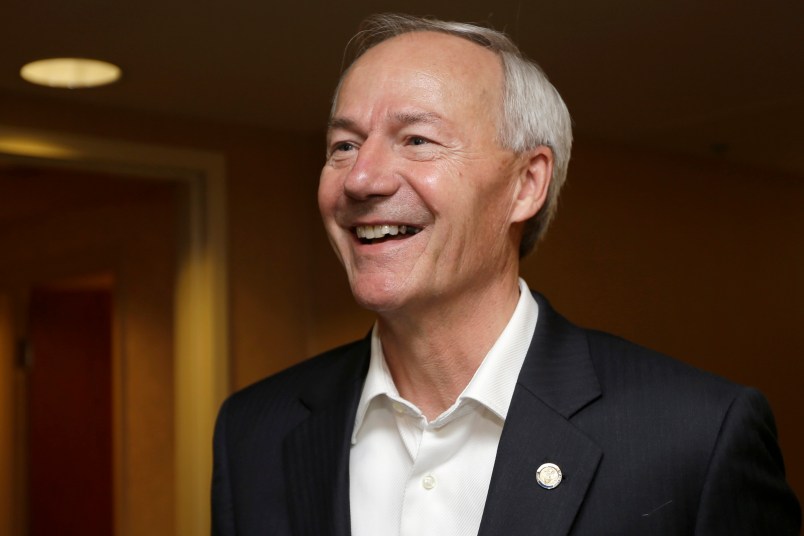Going into Election Day, Medicaid expansion advocates had reason to be optimistic. If things broke the right way in a half dozen competitive gubernatorial races, health coverage could come to a million uninsured people.
But as Republicans stormed to victory in almost every notable election in the country, Medicaid expansion might not make any inroads in those states — and might even lose ground in one place that pioneered a unique expansion plan.
Before the election, TPM pointed out five states where incumbent Republican losses could brighten the prospects for Medicaid expansion. In every one of those states, the GOP won: Wisconsin’s Scott Walker, Maine’s Paul LePage, Florida’s Rick Scott, Kansas’s Sam Brownback and Georgia’s Nathan Deal all retained their seats.
On top of that, there is now reason to think that Medicaid expansion might be endangered in Arkansas, where health coverage for up to 200,000 people could be at risk.
Arkansas has always been a special case. Democratic Gov. Mike Beebe, working with moderate Republicans and in coordination with the Obama administration, developed an alternative mechanism for the expansion in early 2013. The so-called “private option” alternative uses Medicaid money to pay for private insurance for poor people who wouldn’t otherwise be able to afford health insurance.
Conservatives in the legislature were almost able to undo the state’s unique expansion plan this spring because the funding must be approved annually by 75 percent of each legislative chamber, as the Arkansas Times’ Dave Ramsey outlined Wednesday. It took some explicitly tit-for-tat political deal-making to preserve the so-called private option this year.
In Tuesday’s election, conservatives in the legislature have picked up more votes to block Medicaid expansion when it comes up for a vote again next year, Ramsey reported. The policy passed with no votes to spare in the Senate this year. Now, it might be four votes short in that chamber. The numbers are a little better in the House, but Republicans are still increasing their majority from 51 seats to as many as 66 once the vote-counting is finished. The more moderate GOPers have backed the policy in the past, but now just a fraction of the caucus in that chamber could block it.
House Majority Leader Kenneth Bragg, who supported the private option, told Governing magazine’s Chris Kardish on Thursday: “Right now, if you took a vote based on what everybody ran on, the votes aren’t there.”
Newly elected Republican Gov. Asa Hutchison didn’t campaign on ending Medicaid expansion in Arkansas, but he will almost certainly not be the forceful advocate for it that Beebe was.
“I view the Private Option as a pilot project,” Hutchison said in his campaign’s official statement on the policy. “A pilot project that can be ended if needed.”
One (Possible) Bright Spot: Alaska
The gubernatorial race hasn’t been called yet, but independent Bill Walker appears to be heading to a narrow win over Republican Gov. Sean Parnell. If that holds, it could improve the odds of Medicaid expansion in that state. Walker supported Medicaid expansion, and as the New York Times noted, the debate in Alaska “has focused on a lot of technical details and not on broad ideological ideas about government.” So Walker’s win could push it over the top.
The Kaiser Family Foundation’s Larry Levitt also noted to TPM that in states where Republicans are already negotiating with the Obama administration, like Indiana, Utah and Wyoming, Tuesday’s outcomes are unlikely to change things.







GOTP wont be happy until poor folks are dying from lack of medical care and we are all footing the bill…
2016 prediction: The Republican House will pass all sorts of bat shit crazy bills. The Republican Senate will pass a large number of those bat shit crazy bills–with the help of some spineless Senate Democrats. The President will wield his veto pen on most, but not all, bat shit crazy bills. Several vetoed bat shit crazy bills will be overridden with the help some spineless Democrats. We’ll see rollbacks of good–or just passable–legislation at every turn. Come 2016, America will be poorer, less healthy, less educated, FAR less informed, and more divided than ever. Hillary will still be elected, we’ll end up with a near 50-50 Senate, and a heavily Republican controlled House.
Why? I believe Winston Churchill said it very well indeed. “The best argument against democracy is a five minute conversation with an average voter.”
The average voter, as usual, just voted against their own personal interests. Mind boggling.
Instead of just hanging out waiting for a handout, those folks in need of Medicaid should have voted on Tuesday: it could have made a difference. A lot of us are getting sick and tired of doing their bidding.